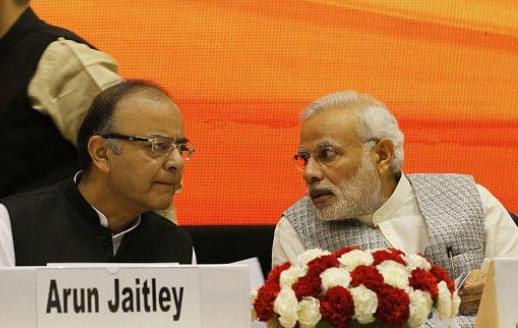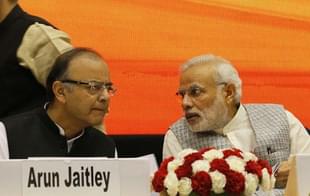Insta
Government’s Rs 2.11 Lakh Crore Bank Recapitalisation Plan Sufficient To Tackle NPAs: SBI Report
Swarajya Staff
Oct 26, 2017, 09:15 PM | Updated 09:15 PM IST
Save & read from anywhere!
Bookmark stories for easy access on any device or the Swarajya app.


The government's Rs 2.11 lakh crore recapitalisation plan for banks is sufficient to tackle the bad loan problem and will also give a push to economic growth, says a State Bank of India (SBI) research report.
On Tuesday, Finance Minister Arun Jaitley unveiled the road map for strengthening of bad loans-hit public sector banks. The plan includes a Rs 1.35 lakh crore recapitalisation bonds.
"If the structure of 1990s adopted, then this would not alter any fiscal maths," said SBI in its report 'Ecowrap'.
An interest cost of Rs 8,000 crore per year is only 0.07 per cent of GDP and 1.6 per cent of the total interest payment on revenue expenditure of the government, it said.
Recapitalisation of banks through recapitalisation bonds has precedence not only in India but also in many other countries including Chile, Philippines, Finland, Hungary, Argentina, Korea and Malaysia.
India had used this tool before during 1985-86 to 2000- 01, wherein the Government recapitalised PSBs with the total amount of Rs 20,446 crore.
"The cost is very negligible, given the current context and the huge multiplier impact. Gross Domestic Product (GDP) ratio will increase by 0.8 per cent (based on revised nominal GDP figures as released by CSO)," it said.
After provision of bad assets, the report believes there may still be around Rs 1 lakh crore available for lending.
"The resultant multiplier impact of Rs 1 lakh crore could unleash at least Rs 3.3 lakh crore and that could go up to Rs 10 lakh crore additional infusion in the economy. This could concomitantly push up the GDP," the report said.
As per latest figures by the finance ministry the NPAs have increased to the tune of Rs 4.55 lakh crore from 2014-15 till June 2017. The increased provisioning in the time period 2014-15 to 2017-18 is pegged at Rs 3.79 lakh crore. So the amount of banking sector recapitalisation to the tune of Rs 2.11 lakh crore seems sufficient for tackling the problem of stressed assets, the report said. (PTI)





